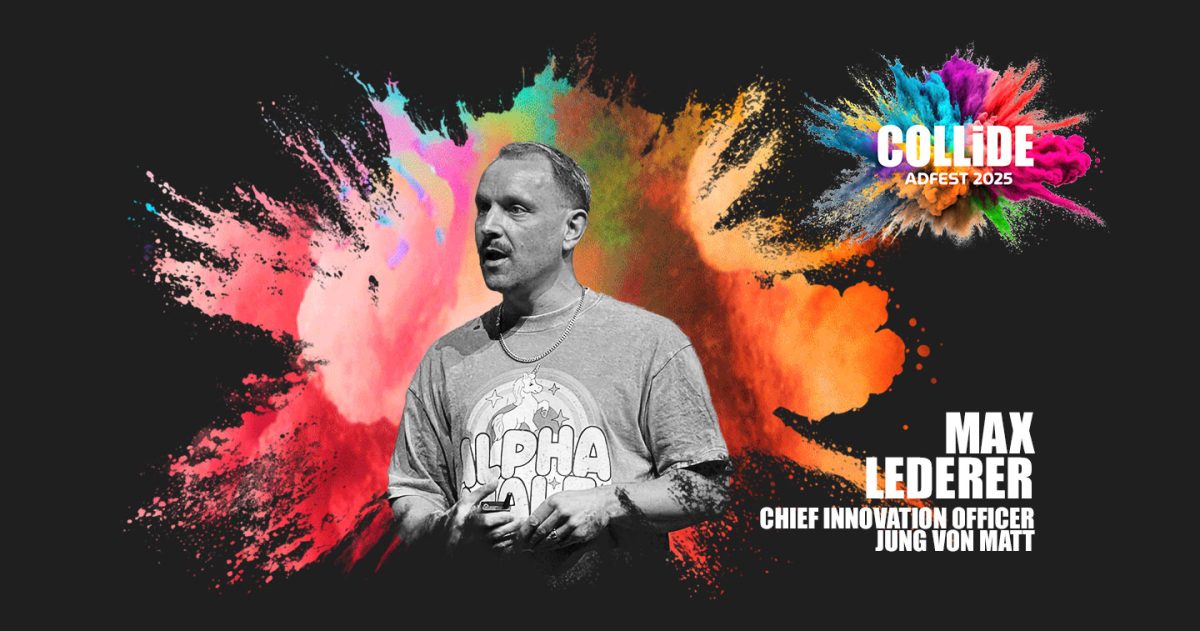PATTAYA, THAILAND — After delivering his keynote talk, “The Missing Link: How GenA.I. Augments Creativity and Impactful Advertising,” on the second day of ADFEST 2025, Max Lederer, Chief Innovation Officer at Jung von Matt, sat down with adobo Magazine for an exclusive interview.
In his keynote, Max explored AI’s transformative potential in marketing, particularly in the APAC region. Drawing from Jung von Matt’s work with Hyundai, he demonstrated how generative AI is revolutionizing creative excellence and marketing efficiency by accelerating ideation, personalization, and content execution. However, he emphasized a balanced perspective — one that combines optimism with humility— to ensure sustainable growth and responsible innovation.
AI’s rapid development has sparked apprehension in the advertising industry, a concern that Max fully understands. “It develops pretty fast, so it can be scary, right?” he noted, acknowledging how AI’s ability to generate human-like images and speech challenges the core business of creative professionals. The automation of traditionally human-led tasks raises questions about profitability and the evolving role of agencies. While AI offers efficiency, it also forces the industry to rethink the creative process.
This is particularly crucial in culturally diverse regions like APAC, where brands must ensure sensitivity and authenticity.
Max pointed to an automation project Jung von Matt undertook recently for a mobility brand, which required human oversight for accurate Chinese translation. AI, he explained, still struggles with cultural nuance, making human intervention essential to maintaining brand integrity. He also observed that in Germany, branding agencies were among the first to integrate AI effectively into their workflows. Citing Mutabor, a German agency that trains AI models on corporate identities, he highlighted how this approach enables the generation of brand-consistent visuals.



“If you train it right and manipulate it correctly—that’s why we believe you need both creatives and technologists to train the model—then you can really control the output in an excellent way,” he explained.
Despite these advancements, Max is firm in his belief that AI should complement — not replace — human creativity. He described the early stages of ideation, where teams explore the most obvious ideas before refining them into something more unique. This process, he noted, aligns with AI’s strengths.
“Sometimes, if you run ChatGPT during those first few days, you see the collective ideas that naturally come up. Once we’ve gone through that, we can set them aside and move closer to a more precise and unique insight to develop a stronger idea.”
Instead of relying on AI for original thought, he sees its greatest value in supporting creative work—illustrating, building presentations, and animating to enhance efficiency.
Beyond creativity, AI’s impact raises ethical and regulatory concerns. When asked about AI-generated content and identity theft, Max acknowledged the complexities of data security and compliance.
Regulations like the GDPR in Europe create additional challenges, particularly when many U.S. models fail to meet these standards. “That’s why we sometimes struggle — many U.S. models bypass Europe because they don’t want to fulfill the regulations,” he admitted. To ensure compliance, Jung von Matt runs AI models on EU servers and adheres to strict data protection policies. The legal uncertainties surrounding foundation models, he added, make it imperative to create secure environments that protect both brands and consumers.
“I cannot point this out enough, we’re not anti-regulations — I’m actually a fan of them. I think it is risky technology, so we have to try and kind of tame it,” Max told adobo Magazine. “While we provide the most secure and legal interface currently possible for our clients, we still have to share the risk if we want to innovate.”
Looking ahead, Max believes cultural change remains one of AI’s biggest challenges. Organizations must foster a culture of curiosity to adapt to evolving AI capabilities, embracing new technologies while maintaining their creative core. He also underscored the need for clarity and confidence within the industry. Taking a step back to focus on real-use cases, he argued, is essential in proving AI’s role in building outstanding creativity. “We need to prove the proper use cases of AI technology to build outstanding creativity and creative excellence,” he concluded.










